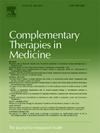Efficacy of acupuncture-based treatment in Chronic Obstructive Pulmonary Disease – A systematic review and meta-analysis
IF 3.5
3区 医学
Q1 INTEGRATIVE & COMPLEMENTARY MEDICINE
引用次数: 0
Abstract
Background
The COPD population will steadily increase due to continuous exposure to COPD risk factors and the aging demographics. Acupuncture, as a common modality in complementary medicine, has been widely applied in the treatment of COPD in recent years. However, systematic reviews of the efficacy of acupuncture-based traditional Chinese external treatment in COPD are relatively scarce and when considering the quality of randomized controlled trials evidence remains insufficient.
Objective
To provide an updated systematic review and meta-analysis of the effectiveness of acupuncture-based treatment for COPD using the latest data and a rigorous evaluation system.
Methods
Randomized controlled trials evaluating any form of acupuncture in COPD in a stable phase or acute exacerbation phase (AECOPD) were selected from Medline, Cochrane Library, Web of Science, Embase, CNKI, the Wanfang database, VIP, and SinoMed, encompassing a publication period from January 1st, 2000, to May 1st, 2025. The completeness of each study was evaluated according to the Consolidated Standards of Reporting Trials (CONSORT) and Standards for Reporting Interventions in Clinical Trials of Acupuncture guidelines (STRICTA). A meta-analysis was conducted using Cochrane RevMan.
Results
A total of 1294 articles were retrieved from the selected database and 25 articles meeting the criteria were included. According to CONSORT, 8 studies rated as high quality, 16 studies as moderate quality, and 1 study as low quality. Due to the heterogeneity of outcome parameters and the limited number of AECOPD studies, meta-analysis could only be performed for COPD in the stable phase. In the meta-analysis, acupuncture-based treatments were significantly superior to controls in COPD in the primary outcome 6-minute walk distance (6MWD: p < 0.01) and the secondary outcomes Borg Scale (p < 0.05), forced expiratory volume in 1 s (FEV1: p < 0.01) and forced vital capacity (FVC: p < 0.05); no significant differences were found in the St. George's Respiratory Questionnaire (SGRQ) and the COPD Assessment Test (CAT).
Conclusions
Acupuncture-based treatments significantly enhance the 6MWD, Borg Scale, FEV1 and FVC in COPD patients. The predominance of moderate quality studies indicates the ongoing need for improvement to ensure the credibility of data.
针灸治疗慢性阻塞性肺疾病疗效的系统评价与meta分析
背景:由于持续暴露于COPD危险因素和人口老龄化,COPD人口将稳步增加。针刺作为一种常见的辅助医学方式,近年来在慢性阻塞性肺病的治疗中得到了广泛的应用。然而,针对中医针灸外敷治疗COPD疗效的系统综述相对较少,考虑到随机对照试验的质量,证据仍然不足。目的:利用最新数据和严格的评估系统,对针灸治疗COPD的有效性进行最新的系统回顾和荟萃分析。方法:从Medline、Cochrane Library、Web of Science、Embase、CNKI、万方数据库、VIP和中国医学信息网(SinoMed)中选取评价任何形式针灸治疗COPD稳定期或急性加重期(AECOPD)的随机对照试验,涵盖2000年1月1日至2025年5月1日的发表期。每项研究的完全性根据联合试验报告标准(CONSORT)和针灸临床试验干预报告标准指南(STRICTA)进行评估。采用Cochrane RevMan进行meta分析。结果:从选定的数据库中共检索到1294篇文献,纳入符合标准的文献25篇。根据CONSORT, 8项研究被评为高质量,16项研究被评为中等质量,1项研究被评为低质量。由于结果参数的异质性和AECOPD研究数量有限,只能对处于稳定期的COPD进行meta分析。在meta分析中,针灸治疗在COPD患者6分钟步行距离(MWD)的主要终点上明显优于对照组。结论:针灸治疗可显著提高COPD患者6MWD、Borg量表、FEV1和FVC。中等质量的研究占主导地位表明需要不断改进以确保数据的可信度。
本文章由计算机程序翻译,如有差异,请以英文原文为准。
求助全文
约1分钟内获得全文
求助全文
来源期刊

Complementary therapies in medicine
医学-全科医学与补充医学
CiteScore
8.60
自引率
2.80%
发文量
101
审稿时长
112 days
期刊介绍:
Complementary Therapies in Medicine is an international, peer-reviewed journal that has considerable appeal to anyone who seeks objective and critical information on complementary therapies or who wishes to deepen their understanding of these approaches. It will be of particular interest to healthcare practitioners including family practitioners, complementary therapists, nurses, and physiotherapists; to academics including social scientists and CAM researchers; to healthcare managers; and to patients. Complementary Therapies in Medicine aims to publish valid, relevant and rigorous research and serious discussion articles with the main purpose of improving healthcare.
 求助内容:
求助内容: 应助结果提醒方式:
应助结果提醒方式:


